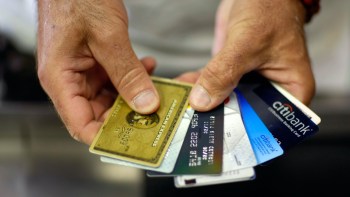
Can credit card companies sustain their rewards programs?
Share Now on:
Can credit card companies sustain their rewards programs?

Those credit card rewards American Express is using to entice customers seems to be paying off for now.
American Express recently released its first-quarter earnings report, revealing its biggest-single expense was its card member rewards, which rose 4% from the same period last year to $2.45 billion. However, that helped boost customer spending 4% from a year ago.
It also earned $2.01 per share (beating the $2 per share that Wall Street expected), while raking in $10.36 billion in revenue (it was short of the $10.49 billion that analysts expected, but almost 7% higher year over year).
“It’s kind of a blessing and a curse for them, that they get more people to use the card, but they’ve got to pay more to incentivize you,” said Ted Rossman, industry analyst at CreditCards.com.
Can the rewards last, though?
“I think it’s clear that there’s a huge demand among consumers to leverage credit card rewards as much as possible,” said Sarah Chenven, chief operating and strategy officer at Credit Builders Alliance.
In the grand scheme of things, Rossman said he doesn’t think a 4% increase in rewards expenses is a big hit for the company. But he said there is a shift in the industry where credit card issuers are getting tired of the rewards arms race to attract new customers.
The major credit card issuers had been ratcheting up the stakes over the past several years to the excitement of credit card customers. Chase released its Sapphire Reserve credit card back in 2016, which initially came with a 100,000-point sign-up bonus worth up to $1,500 in free travel (it’s now dropped to 50,000 points, equivalent to $750) and a $300 annual travel credit, among other perks.
A worried American Express then changed up its Platinum Card, providing more membership rewards, while Bank of America also released its own premium card.
“What we’ve noticed in the couple of years since is that it’s really not sustainable. Especially as we a crossed here into 2019, we started to see a lot of companies pulling back on the mega sign-up bonus and shifting more into other kinds of rewards,” Rossman said. “That can be gamed. A lot of people were spending just enough to get the bonus.”
Instead of those sign-up bonuses, Rossman said credit card companies are moving more toward providing dining rewards.
There’s a lot happening in the world. Through it all, Marketplace is here for you.
You rely on Marketplace to break down the world’s events and tell you how it affects you in a fact-based, approachable way. We rely on your financial support to keep making that possible.
Your donation today powers the independent journalism that you rely on. For just $5/month, you can help sustain Marketplace so we can keep reporting on the things that matter to you.


















